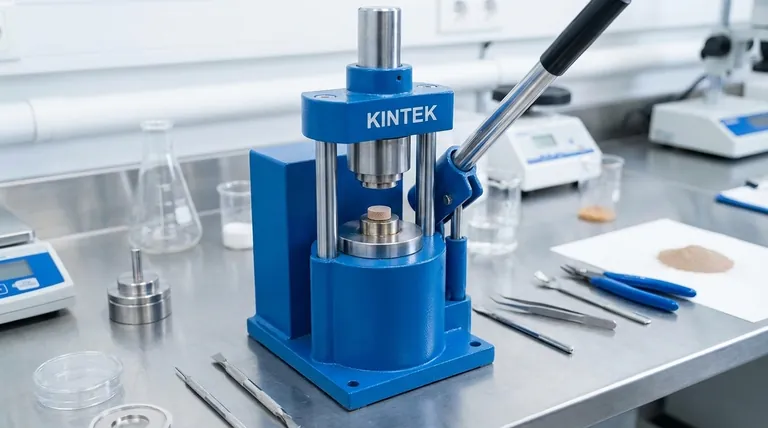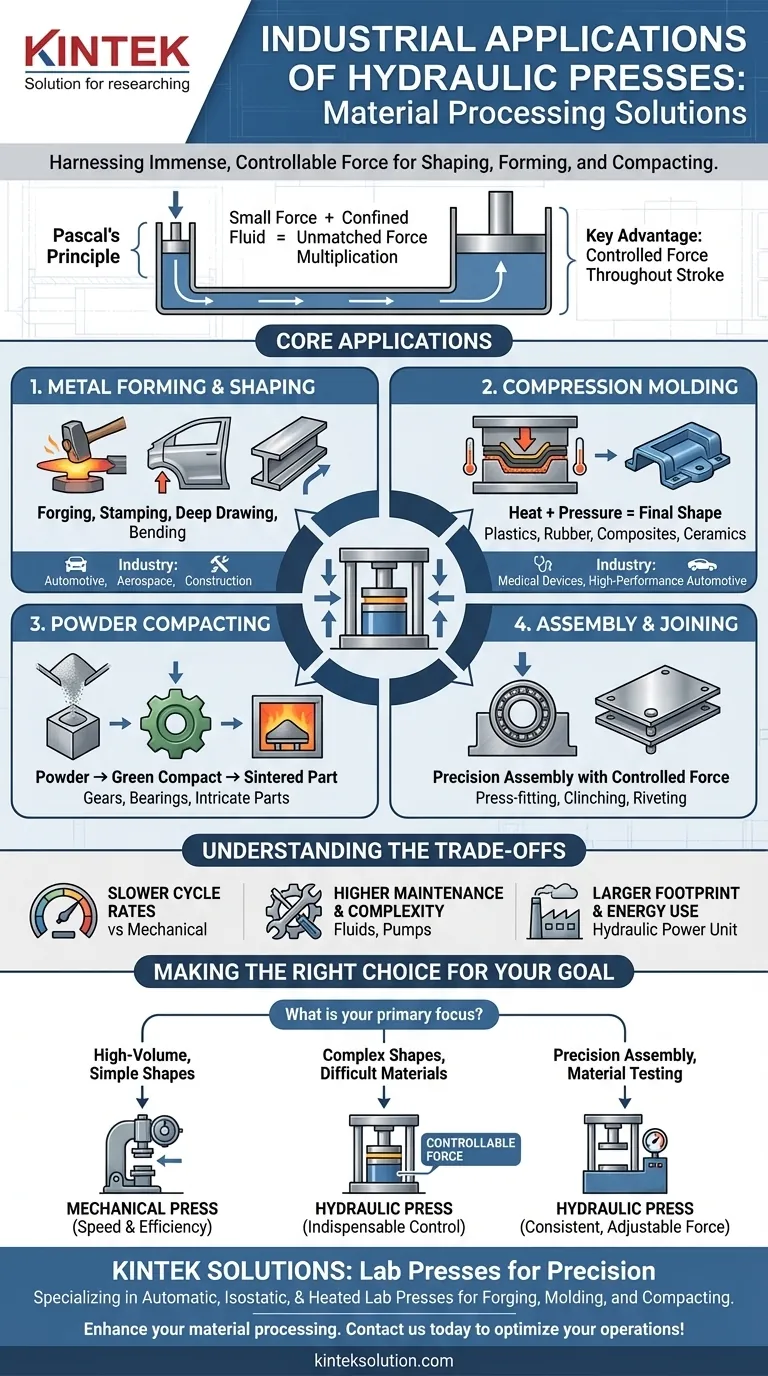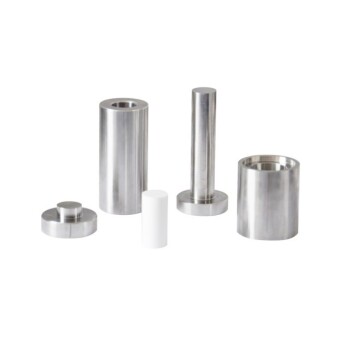At its core, a hydraulic press is used for any industrial process requiring immense, controllable force to shape, form, or compact materials. Its applications span from crushing entire vehicles for recycling to the high-precision molding of aerospace components, including forging, stamping, deep drawing, and compacting powdered metals and ceramics.
The fundamental value of a hydraulic press isn't just the raw power it delivers, but its ability to apply that force with exceptional control throughout its entire operational stroke. This unique combination makes it indispensable for working with challenging materials or forming complex shapes that other machines cannot handle.

The Principle: Why Hydraulic Force is Essential
To understand its applications, you must first understand its core advantage: the controlled multiplication of force. This is based on Pascal's principle, where pressure applied to a confined fluid is transmitted undiminished.
Delivering Unmatched Force
A small amount of force applied to a small piston in a hydraulic system generates an enormous amount of force on a larger piston. This simple principle allows hydraulic presses to generate thousands of tons of force, making it possible to bend, shape, and crush even the strongest metals.
Precision and Control
Unlike mechanical presses that deliver maximum force only at the bottom of their stroke, a hydraulic press can apply full, consistent pressure at any point. This allows for unparalleled control over processes like deep drawing or molding, where the material must be shaped slowly and deliberately to prevent defects.
Operational Versatility
The same machine can be programmed for a delicate molding task or a high-tonnage forging operation. This flexibility in force, speed, and stroke length makes the hydraulic press a versatile workhorse across numerous manufacturing sectors.
Core Applications in Material Processing
The unique capabilities of hydraulic presses make them central to several key industrial processes that shape our modern world.
Metal Forming and Shaping
This is the most common category of applications. It includes processes vital to the automotive, aerospace, and construction industries.
- Forging: Shaping metal by localized compressive forces.
- Stamping & Blanking: Punching or cutting specific shapes out of sheet metal.
- Deep Drawing: Forming sheet metal into deep, cup-like shapes, such as car body panels or kitchen sinks.
- Bending: Creating precise angles in metal beams and plates for construction.
Compression Molding
Hydraulic presses are ideal for molding materials that need both heat and high pressure to take a final shape. This is common for producing parts from plastics, rubber, composites, and ceramics used in everything from medical devices to high-performance automotive components.
Powder Compacting
In powder metallurgy, a hydraulic press is used to compact fine metal or ceramic powders into a solid form, known as a "green compact." This part is then sintered (heated) to create a final, dense, and strong component, a process used for making gears, bearings, and other intricate parts.
Assembly and Joining
The controlled force of a hydraulic press is perfect for assembling components with extreme precision.
- Press-fitting: Forcing a part, like a bearing or a pin, into another part's housing.
- Clinching & Riveting: Joining sheets of metal together without heat or fasteners.
Understanding the Trade-offs
While powerful and versatile, hydraulic presses are not the universal solution for every application. Understanding their limitations is key to appreciating their specific role.
The Cost of Speed
Generally, hydraulic presses are slower than their mechanical counterparts. The time it takes for the hydraulic fluid to flow and build pressure results in lower cycle rates, making them less suitable for very high-volume, simple stamping operations.
Maintenance and Complexity
A hydraulic system involves fluids, pumps, valves, and seals that require regular maintenance to prevent leaks and ensure consistent performance. This complexity can lead to higher operational costs compared to simpler mechanical systems.
System Footprint and Energy Use
Due to the hydraulic power unit and associated components, these presses can have a larger physical footprint. They also consume energy to keep the hydraulic fluid pressurized, even when the press is not actively cycling.
Making the Right Choice for Your Goal
The decision to use a hydraulic press hinges on the specific requirements of the material and the desired outcome.
- If your primary focus is high-volume production of simple shapes: A mechanical press may offer the speed and efficiency you need.
- If your primary focus is forming complex shapes or working with difficult materials (like superalloys or composites): The controllable force and long dwell time of a hydraulic press are indispensable.
- If your primary focus is precision assembly or material testing: The consistent and finely adjustable force of a hydraulic press provides the necessary control and repeatability.
Ultimately, the hydraulic press remains a cornerstone of modern manufacturing because it provides a powerful, precise, and adaptable solution for the most demanding material processing challenges.
Summary Table:
| Application Category | Key Processes | Industries Served |
|---|---|---|
| Metal Forming | Forging, Stamping, Deep Drawing | Automotive, Aerospace, Construction |
| Compression Molding | Molding Plastics, Rubber, Composites | Medical Devices, Automotive |
| Powder Compacting | Compacting Metal/Ceramic Powders | Manufacturing of Gears, Bearings |
| Assembly & Joining | Press-fitting, Clinching, Riveting | Precision Assembly, Manufacturing |
Ready to enhance your material processing with reliable hydraulic presses? KINTEK specializes in lab press machines, including automatic, isostatic, and heated lab presses, designed to meet your laboratory needs. Our solutions deliver precise force control for forging, molding, and compacting applications, ensuring superior results in industries like automotive and aerospace. Contact us today to discuss how our expertise can optimize your operations and drive efficiency!
Visual Guide

Related Products
- Laboratory Hydraulic Press 2T Lab Pellet Press for KBR FTIR
- Laboratory Hydraulic Press Lab Pellet Press Button Battery Press
- Manual Heated Hydraulic Lab Press with Integrated Hot Plates Hydraulic Press Machine
- Automatic Laboratory Hydraulic Press for XRF and KBR Pellet Pressing
- Automatic Heated Hydraulic Press Machine with Hot Plates for Laboratory
People Also Ask
- What is the role of a hydraulic press in KBr pellet preparation for FTIR? Achieve High-Resolution Chemical Insights
- Why is sample uniformity critical when using a laboratory hydraulic press for humic acid KBr pellets? Achieve FTIR Accuracy
- What role does a laboratory hydraulic press play in carbonate powder prep? Optimize Your Sample Analysis
- How are hydraulic presses used in spectroscopy and compositional determination? Enhance Accuracy in FTIR and XRF Analysis
- Why must a laboratory hydraulic press be used for pelletizing samples for FTIR? Achieve Precision in Spectral Data



















